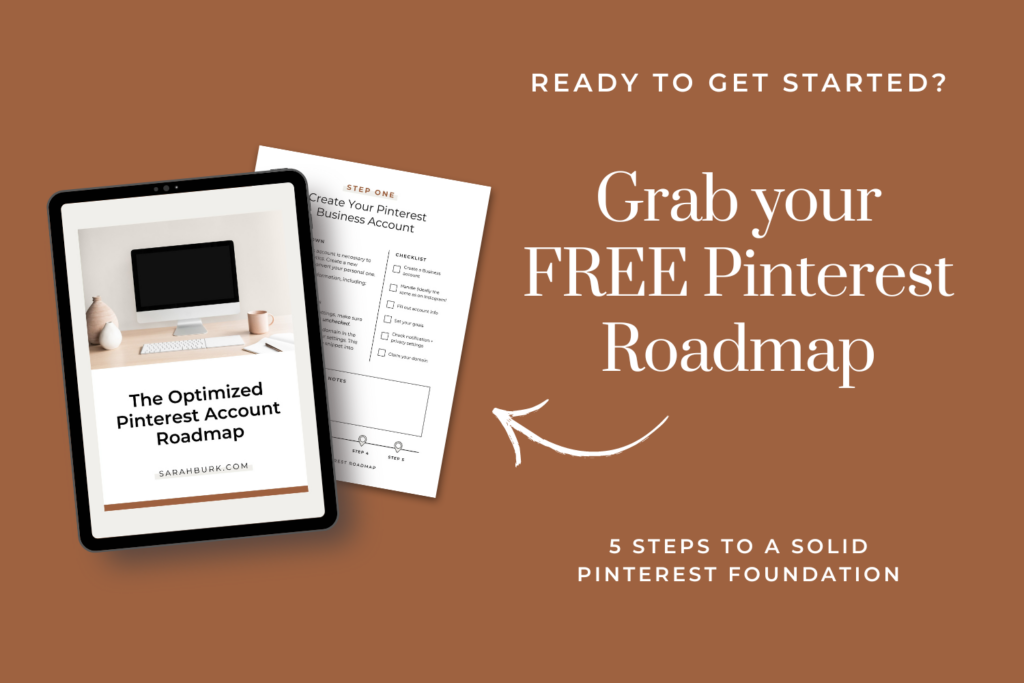If you’re like most people on the social internet, you’ve probably used Pinterest for personal reasons before. Recipes and workout programs you wanted to try? The ubiquitous coral and mint wedding decor of the early 2010s?
Whatever your guilty pleasure was, you probably used Pinterest to search for it. But you’re not exactly sure how to translate that into a marketing strategy for your business.
Whether or not you’ve used Pinterest before, I want to share exactly how powerful Pinterest marketing can be for online businesses. Beyond hopefully convincing you that you should get your business on Pinterest like, yesterday, knowing how Pinterest works is essential to using it effectively.
Understanding Pinterest for Business
At its core, Pinterest is a “bookmarking tool.” It’s designed to allow users to search and save ideas, information, and inspiration.
Just as you were using Pinterest to look up pasta recipes and paint colors, your ideal clients are searching for business tips and marketing ideas.
About Pinterest Users
One of the key differentiators between Pinterest and other social media marketing platforms is its user base and how they use the platform. Unlike other social media apps like Instagram or Facebook, which encourage casual browsing and connecting with people, Pinterest isn’t very social at all. Pinterest users typically go to the platform with a specific intent in mind.
That in turn means they’re much more motivated to take action, whether that’s just reading a blog post, signing up for an email list, or even purchasing a digital product. Pinterest users generally understand the unofficial “contract” of Pinterest content, which is that most pins lead to a blog post where they can find the answers to their questions and might get pitched.
As far as user demographics go, there are over 450 million monthly users on Pinterest, 48% of which use the platform specifically to shop.
Pinterest as a Search Engine
So if Pinterest isn’t a social media platform, what is it? Put simply, Pinterest is a visual search engine.
What that means is that its algorithm is more similar to Google’s than Instagram’s. Pinterest uses all the information you give it about a piece of content to understand and distribute it to the relevant audience.
As a business owner, Pinterest’s search engine algorithm is hugely beneficial. Since the size of your following is largely unimportant, you have an equal opportunity to get your content discovered by your audience, as long as you’re using the right keywords.
What differentiates Pinterest from Google as far as search engines go is largely this visual component. In addition to the actual words in pins, Pinterest compares pins’ visual content and is able to suggest related content based on visual similarity. This is why when you start searching for “brick floor kitchen design,” your feed is full of the same 5 interior design photos for the next few weeks.
When you’re marketing your business on Pinterest, it’s necessary to take both search engine optimization and visual appeal into consideration.
Pinterest as a Discovery Platform
Pinterest is also a platform for discovery. 97% of all Pinterest searches are unbranded, meaning Pinterest users aren’t specifically looking to engage with particular brands or businesses.
As a place for discovery, Pinterest is also usually just one step along the path to purchase. This is especially true for service-based businesses on Pinterest. If you’re marketing high-ticket services, you’ll need to nurture your audience beyond that initial discovery on Pinterest to turn them into actual clients.
I won’t go into the whole concept of marketing funnels and stages of awareness here, but what you need to know is that Pinterest is a top-of-funnel marketing platform.
As an online service provider, you should be using Pinterest to bring more people into your audience and make that first touch! The rest of your Pinterest funnel will help nurture and convert them.
The Benefits of Pinterest for Service-Based Businesses
I could talk your ear off about the different ways the algorithm is optimized to help you ~level up~ your business and “maximize your growth.” But let’s go beyond the fluffy, what-does-that-even-mean buzzwords and talk tangible benefits of Pinterest marketing for service-based businesses.
1. Boosted Brand Awareness & Credibility
This is probably the most overlooked benefit of Pinterest marketing, but one of the most beneficial! When you’re active on multiple platforms, your business automatically gets more credibility.
Pinterest is an excellent platform to showcase your expertise and establish authority in your niche. By consistently sharing informative pins, how-to guides, and industry insights, you’re positioning yourself as the go-to expert in your field.
As you build up an audience on the platform, you’ll become recognizable and trusted in your industry, without having to build up a certain number of followers. Furthermore, when you’re consistently showing up in front of your ideal clients across multiple touchpoints, you stay sticky in their minds. That way, when they go to hire, you’re first on the list.
2. Increased Website Traffic
One of the primary benefits of using Pinterest for your service-based business is how easy it is to drive traffic directly to your website. No more “link in bio” CTAs; every pin can have a different URL leading your audience to take the action you want.
Plus, unlike other social media platforms, most users on Pinterest expect to be directed to a website! Increased web traffic can help boost your Google search engine ranking by keeping users on the page longer, and, of course, you’re naturally getting more eyes on your content, offers, and services. Win-win!
3. Email List Growth
If growing your email list is one of your marketing goals (which it probably should be), Pinterest is one of the BEST ways to do that. Honestly, Pinterest marketing without an email list is just wasted potential.
Getting users from Pinterest to your email list is what really kicks off your Pinterest funnel. That user is giving you an all-access pass to their inbox, where you can continue to build the relationship and turn that subscriber into a client or customer.
4. Dream Client Lead Generation
There’s a good reason I call Pinterest a lead-generating machine. What all of these other benefits build up to is the eventual inquiry or booked client. Ultimately, the endgame of any marketing strategy is getting more leads, turning them into clients, and growing your business, right?
Pinterest can be your secret weapon for generating more leads and actually converting them to clients. By harnessing Pinterest’s power as a search engine, you can tailor your content to reach your DIRECT target audience of ideal clients. Through Pinterest marketing, you’re also typically able to start building a relationship with that potential client earlier than your competitors.
Why Pinterest Matters for Service-Based Businesses
No matter how many times you hear that Pinterest is “only prioritizing e-commerce” or that “only bloggers can succeed” on Pinterest, it will never be 100% true.
I don’t make a lot of absolute claims, but this is one I feel pretty good about:
You can absoLUTELY benefit from Pinterest marketing as an online service provider.
Your strategy might look a bit different than Pinterest strategy for influencers, shops, or photographers. In fact, it should definitely look different! But that doesn’t mean Pinterest can’t work its booty off for you.
Keyword-optimized, valuable content that meets your target audience where they’re at will always have a place on Pinterest.
The keywords might be fewer and the audience might be smaller, but you can still book dreamy clients that bring you thousands of dollars and grow your email list by the hundreds.
Don’t believe me? Check out this case study of a copywriter who booked multiple clients directly from Pinterest, earning her tens of thousands of dollars.
How did it work? Typically, clients would discover her content in a Pinterest search, become obsessed with her content, subscribe to her newsletter, and after being a loyal fan for months, reach out and book.
While there are many parts to that process, Pinterest was the initial step, without which those clients might not have discovered my client.
How to Use Pinterest as an Online Service Provider
When creating Pinterest content, always keep your audience in mind. What questions are they asking? What are they searching for? How can you frame your content in a way that entices them to click through and learn more?
Keep those questions and the details you’ve learned here in mind as you work on your Pinterest marketing. Now that you know how the platform works and what users are looking for, practice creating from that mindset and iterating from what you create. That’s how you’ll be able to grow on Pinterest and hone in on what really works for you and your service-based business!

